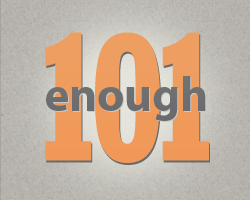
Editor’s Note: This post is intended to provide a contextual background for understanding the complex issues that the Enough Project works on. It is part of the series Enough 101.
Some important legal terms come into play when following and advocating against crimes committed in some of the world’s most deadly and protracted conflicts where the Enough Project focuses. While not all of these crimes exist in all of the areas where Enough works, this vocabulary list defines words to know to understand the atrocities committed in South Sudan and Sudan, eastern Congo, the region affected by the Lord’s Resistance Army, and Somalia.
The International Criminal Court began operating on July 1, 2002. The court was established by the Rome Statue in 1998 to have jurisdiction over persons over crimes of international concern, complementary to national criminal jurisdictions. The court is headquartered at The Hague in the Netherlands. It tries crimes against humanity, genocide, war crimes, and the crime of aggression.
The Crime of Genocide, detailed in Article 6 of the Rome Statute, includes any of the five acts (listed below) committed with intent to destroy, in whole or in part, a national, ethnical, racial, or religious group:
- Killing members of the group
- Causing serious bodily or mental harm to members of the group
- Deliberately inflicting on the group conditions of life calculated to bring about its physical destruction in whole or in part
- Imposing measures intended to prevent births within the group
- Forcibly transferring children of the group to another group
For a crime to qualify as genocide, it must include both the intent and at least one of the five acts listed above, according to Articles II and III of the 1948 Convention on the Prevention and Punishment of Genocide.
Crimes Against Humanity, as defined by Article 7 of the Rome Statute, include any widespread or systematic attack directed against any civilian population including:
- Murder
- Extermination
- Enslavement
- Deportation or forcible transfer of population
- Imprisonment or other severe deprivation of physical liberty
- Torture
- Rape or sexual slavery or enforced prostitution or any form of sexual violence of comparable gravity
- Enforced disappearance of persons
- The crime of apartheid
- Other inhumane acts of a similar character intentionally causing great suffering, or serious injury to body or to mental or physical health
War Crimes apply to armed conflict and include any of the following, according to the Rome Statute, Article 8:
- Willful killing
- Torture or inhuman treatment, including biological experiments
- Willfully causing great suffering, or serious injury to body or health
- Extensive destruction and appropriation of property, not justified by military necessity and carried out unlawfully and wantonly
- Compelling a prisoner of war or other protected person to serve in the forces of a hostile power
- Willfully depriving a prisoner of war or other protected person of the rights of fair and regular trial
- Unlawful deportation or transfer or unlawful confinement
- Taking of hostages
Thomas Lubanga, a Congolese rebel leader, became the first person tried by the ICC for war crimes in January 2009.
The Crime of Aggression is the use of armed force by one state against another state without the justification of self-defense or authorization by the United Nations Security Council. Though listed as a crime over which the ICC has jurisdiction, the Crime of Aggression was not defined until a 2010 amendment to the Rome Statute. Examples of acts of aggression include: invasion by armed forces, bombardment, and blockade.

